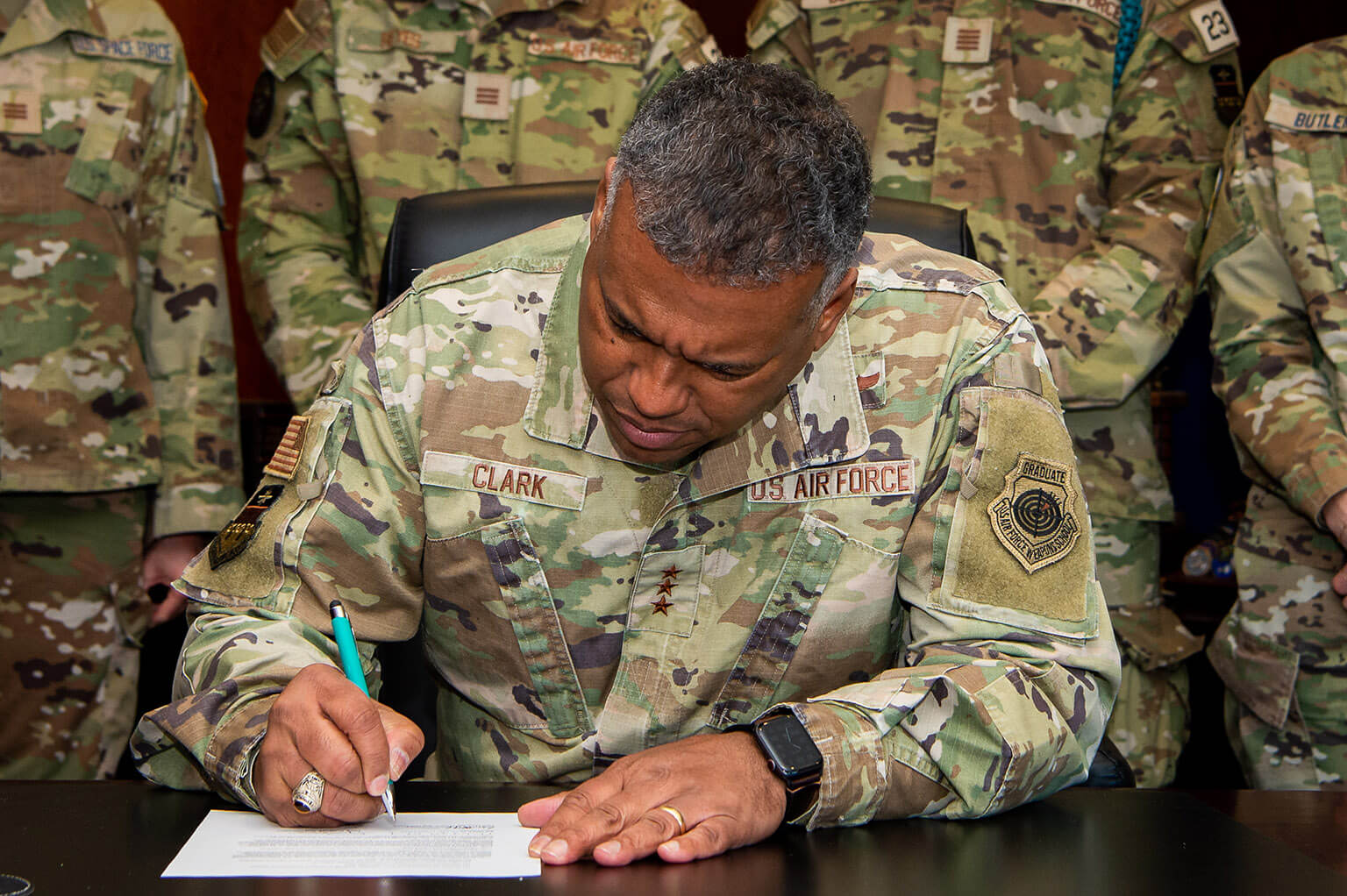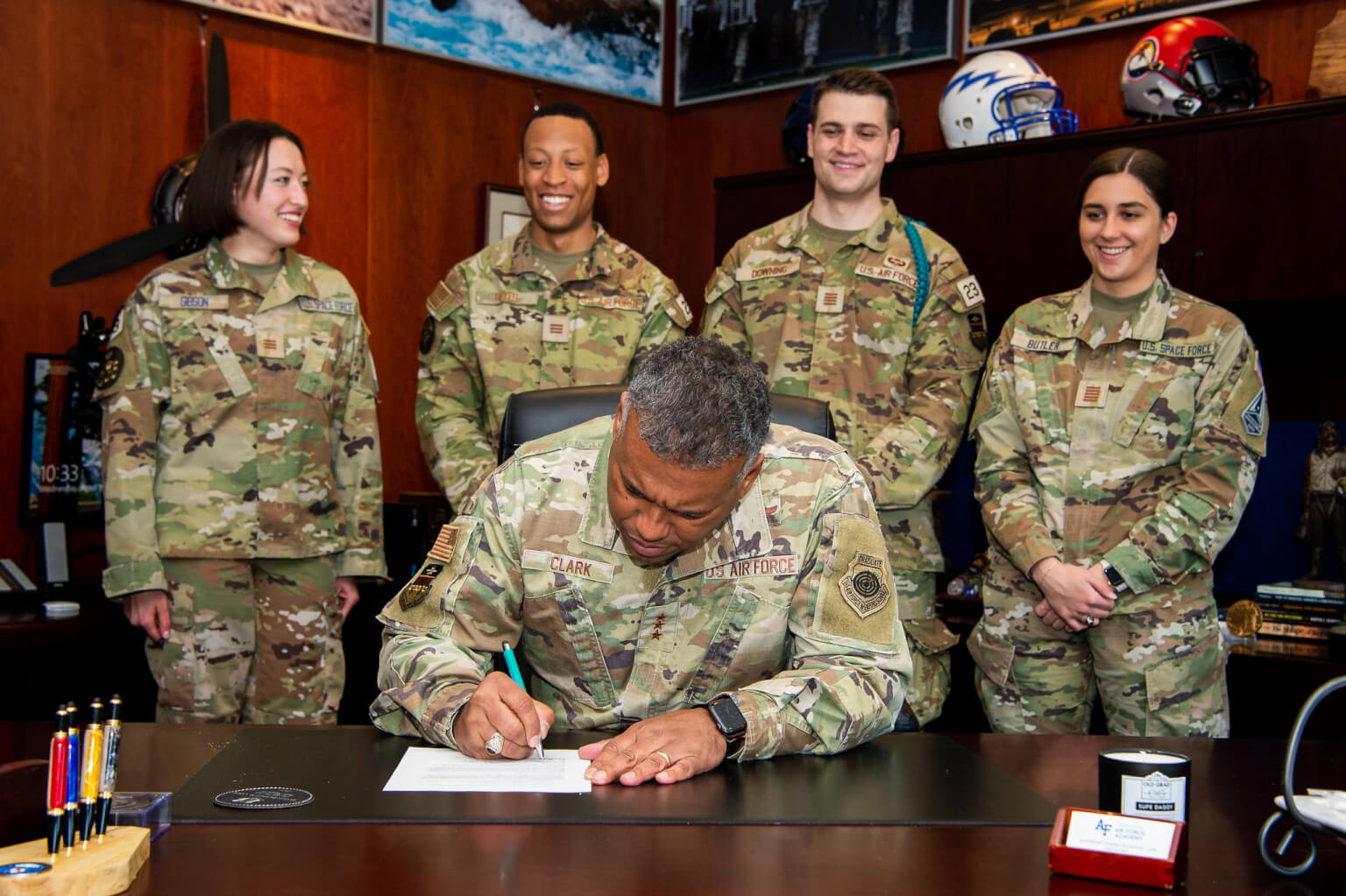Cadet team removes assault, harassment reporting barriers
 Lt. Gen. Richard Clark, U.S. Air Force Academy superintendent, signs the Encouraged to Report policy memo April 10, 2023. (U.S. Air Force photo by Justin R. Pacheco)
Lt. Gen. Richard Clark, U.S. Air Force Academy superintendent, signs the Encouraged to Report policy memo April 10, 2023. (U.S. Air Force photo by Justin R. Pacheco)
By Randy Roughton
U.S. Air Force Academy Strategic Communications
U.S. AIR FORCE ACADEMY, Colo. – Victims of sexual assault at the U.S. Air Force Academy lived under the protection provided by the Safe to Report policy for five years. However, witnesses and victims of less severe crimes had no such protection until a group of legal studies cadets created the Encouraged to Report policy as their capstone project.
While Safe to Report protects sexual assault victims, Encouraged to Report focuses on the potential witnesses of sexual assault and witnesses of violations less than assault, said Lt. Col. Taren Wellman, Academy professor of law and a capstone project mentor.
Discretion in consequences
The policy allows air officers commanding to exercise discretion in punishing collateral misconduct for cadets who report hazing, harassment and bullying as either witnesses or victims as well as those who report sexual assault as witnesses. Whether AOCs decide to punish for the lesser offenses or not, they must now report their decision to their group commanders within seven calendar days.
“There was not a protection in place that allowed a commander to decide not to punish the things the victim might have done,” Wellman said, referring to misconduct such as underage drinking or leaving the base without authorization. “[Safe to Report] also did nothing to help with reporting when witnesses were involved. So, if they saw sexual assault or harassment happening, but the witness also engaged in collateral misconduct, it did nothing to address that barrier to reporting.”
However, Encouraged to Report does not eliminate all possible consequences for collateral misconduct, Wellman said. The policy simply allows commanders to weigh factors in deciding whether to punish, and to what extent, where such discretion did not previously exist. It also provides consistency in how collateral misconduct is treated among the Academy’s 40 squadrons.
Barriers to reporting misconduct
Wellman and Maj. Lauren Kruse presented the policy gap problem to four legal capstone students. Seniors Aeris Butler, Teah Gibson, Sydney Reyes and Gabe Downing, now Academy graduates, worked all spring semester to develop the Encouraged to Report policy.
Sexual assault reports and surveys supported what cadets told leadership: A barrier existed that deterred reporting possible assaults by witnesses and victims because cadets didn’t want to get their friends in trouble. Commanders were often either mandated or strongly encouraged to punish relatively minor infractions by cadets who reported attacks. Cadets saw fellow students face serious consequences for reporting, including dismissal from the Academy in some cases.
“We knew our leadership was discussing the barriers to reporting sexual assault because the (Service Academy Gender Relations) surveys had announced that the Academy basically had a long way to go before everyone felt comfortable and safe,” Butler said.
“Even before those surveys, we had numerous cases at the Academy that were eerily similar,” Butler continued. “Cadets didn’t want to come forward for fear of retaliation, extra bullying, and plain criticism for their deviance from Academy norms. That’s when we knew there was a problem and we might have a solution.”
Instituting the new policy
The legal studies capstone team provided training to all AOCs as well as teal rope cadets to increase understanding and awareness of the Encouraged to Report policy.
 Behind Lt. Gen. Richard Clark stand 2nd Lts. Teah Gibson, Sydney Reyes, Gabe Downing and Aeris Butler, who wrote the policy as part of their legal studies capstone in the spring. (U.S. Air Force photo by Justin R. Pacheco)
Behind Lt. Gen. Richard Clark stand 2nd Lts. Teah Gibson, Sydney Reyes, Gabe Downing and Aeris Butler, who wrote the policy as part of their legal studies capstone in the spring. (U.S. Air Force photo by Justin R. Pacheco)
Academy superintendent Lt. Gen. Richard Clark, commandant of cadets Brig. Gen. Paul Moga, dean of the faculty Brig. Gen. Linell Letendre, and executive director of athletics Jennifer Block signed the policy April 10. The policy signing coincided with Sexual Assault Awareness and Prevention Month.
The new policy was also included in the “Let’s Be Clear” campaign. Let’s Be Clear is the Academy’s long-term Sexual Assault Prevention and Response plan to shift its culture to encourage prevention and response focused on three sub-themes: leaders of character create healthy cultures; warfighters respond to harm courageously; and effective teams accelerate accountability.
See more photos of the policy signing in our Flickr album.